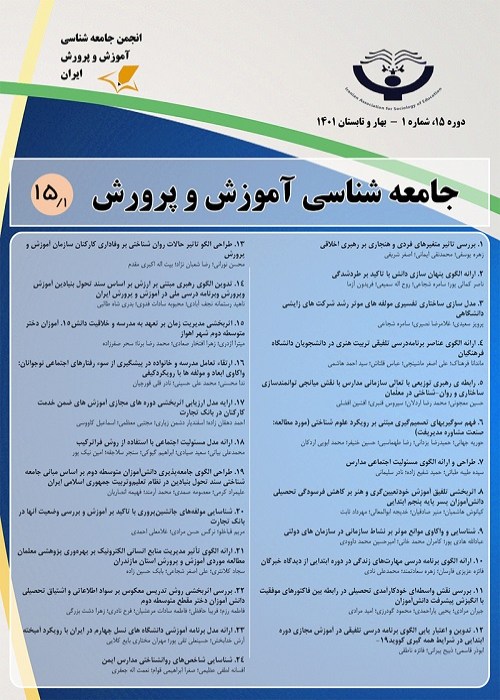Investigating the Status of Evaluation Components of Curriculum Quality in the Elementary Schools of Tehran City
Curriculum quality plays an important role in academic success and performance. As a result, the aim of this study was investigating the status of evaluation components of curriculum quality in the elementary schools in Tehran city.
This study in terms of purpose was applied and in terms of implementation method was mixed (qualitative-quantitative). The population of the qualitative section was the curriculum experts and professors of Tehran city, which according to the principle of theoretical saturation number of 12 people of them were selected by purposive sampling method. The population of the quantitative section was male and female teachers of public elementary schools of Tehran city in the 2021-2022 academic years with number 23593 people, which according to the Krejcie and Morgan table number of 377 people of them were selected by cluster sampling method. The research tools were semi-structured interviews and researcher-made questionnaires, which validity of the interviews was confirmed by triangulation method and its reliability was calculated by the coefficient of agreement between two coders 0.83, and the face validity of the questionnaire was confirmed by the opinion of experts and its reliability was calculated by Cronbach's alpha method 0.85. Data were analyzed with open, axial and selective coding methods in MAXQDA software and one-sample t-test in SPSS software.
The findings showed that evaluation of curriculum quality in the elementary schools has 108 indicators in 23 components and 6 dimensions were included systematic approach of evaluation of curriculum quality (with 4 components of strategic thinking, generalizability of goals, receiving corrective feedback and facilitating the teaching and learning process), qualitative evaluation of activities ( with 3 components of evaluation of motivational activities, evaluation of practical activities and evaluation of curriculum activities), quality of modern facilities and technologies (with 3 components of cultural and sports facilities, educational facilities and welfare facilities), quality of structural factors (with 4 components of lack of resources and inappropriate distribution, weak foresight, individual and organizational communication and lack of work discipline), quality assessment of curriculum principles (with 4 components of flexibility, curriculum sequence, curriculum usefulness and curriculum comprehensiveness) and quality assessment of curriculum strategic management (with 5 components of improving the appearance of the curriculum, improving the content of the curriculum, coherence of the curriculum, drawing the vision and growth of national-religious identity). Also, the components of strategic thinking, generalizability of goals, facilitating the teaching and learning process, evaluation of motivational activities, evaluation of practical activities and evaluation of curriculum activities, cultural and sports facilities, educational facilities, welfare facilities, lack of resources and inappropriate distribution, weak foresight, individual and organizational communication, flexibility, curriculum sequence, curriculum usefulness, improving the appearance of the curriculum, improving the content of the curriculum, coherence of the curriculum, drawing the vision and growth of national-religious identity were in favorable situation, but the components of receiving corrective feedback, lack of work discipline and curriculum comprehensiveness were in an unfavorable situation (P<0.001).
The results of this study have many practical implications for education specialists and planners, and they based on the results of this study, can take an effective step towards improving the evaluation components of curriculum quality, especially the three components of receiving corrective feedback, lack of work discipline and curriculum comprehensiveness.
- حق عضویت دریافتی صرف حمایت از نشریات عضو و نگهداری، تکمیل و توسعه مگیران میشود.
- پرداخت حق اشتراک و دانلود مقالات اجازه بازنشر آن در سایر رسانههای چاپی و دیجیتال را به کاربر نمیدهد.


